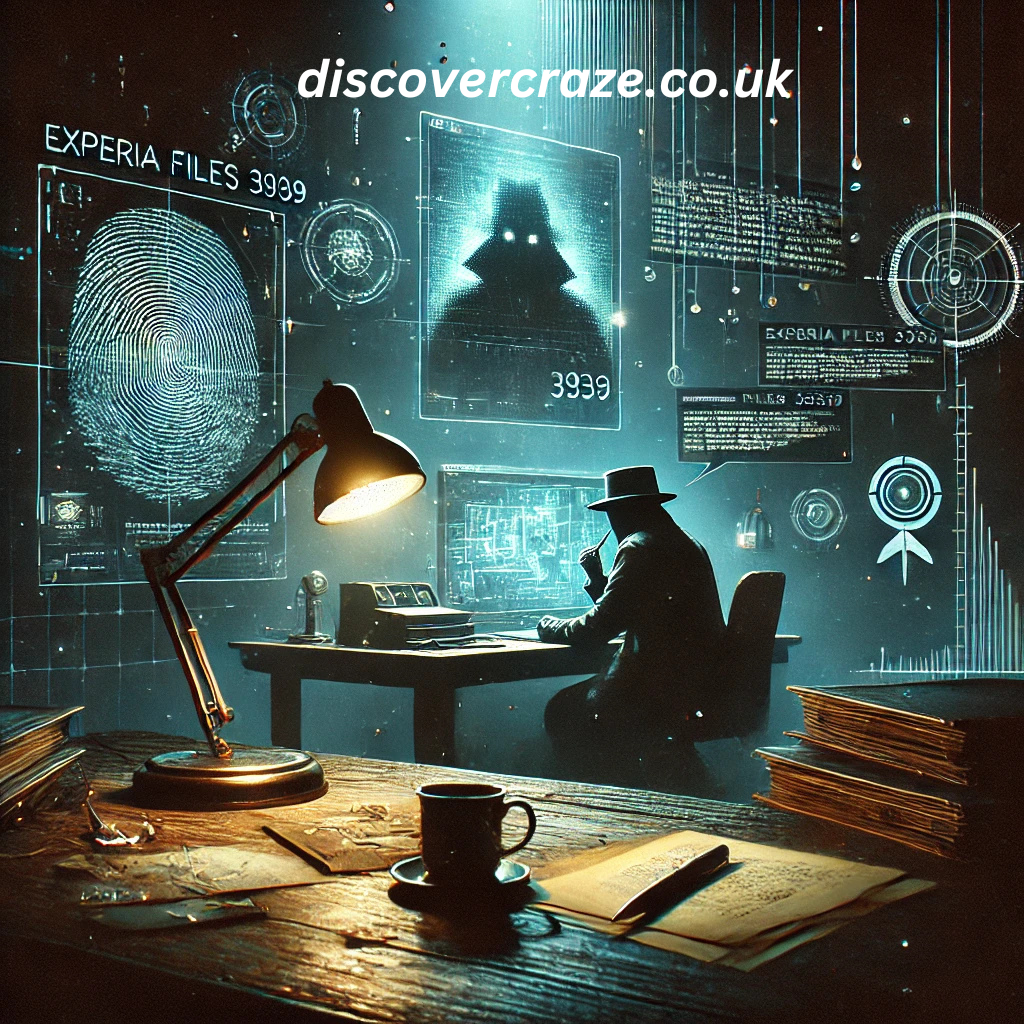Introduction
The realm of speculative fiction is filled with enigmatic works that captivate readers and leave them pondering the genius behind the words. Among such masterpieces, Experia Files 3939 has emerged as a cultural phenomenon. This intriguing and multifaceted text has sparked widespread curiosity, not only for its compelling narrative but also for the mystery surrounding its authorship. Who wrote Experia Files 3939? This question has puzzled fans and critics alike, with theories ranging from a celebrated author using a pseudonym to the work of an anonymous genius. In this blog, we dive deep into the origins, style, and theories surrounding the author of Experia Files 3939, exploring the nuances that make this literary enigma so fascinating. The enigma itself has drawn more readers, as the blend of intrigue and quality storytelling continues to resonate in the literary world.
What Is Experia Files 3939?
Before delving into its authorship, it’s essential to understand what makes Experia Files 3939 a literary marvel. This work is a blend of speculative fiction, science, and existential philosophy. Set in a dystopian future, it explores themes of artificial intelligence, human morality, and the blurred lines between reality and illusion. Through its intricate storytelling and rich thematic content, the book compels readers to question not only the society depicted within its pages but also the direction of our own world.
The Experia Files 3939 is unique in its presentation as well. Each chapter introduces fragments of classified files, conversations, and journal entries, creating an immersive experience for the reader. These non-linear elements encourage readers to piece the story together like a puzzle. The narrative structure, combined with its speculative exploration of technology and ethics, elevates it from mere fiction to a profound commentary on the future of humanity. These qualities make it an enduring work that challenges the intellect while captivating the imagination, which adds to the allure of discovering who truly penned such a masterpiece.
The Mystery Behind the Author
The authorship of Experia Files 3939 remains one of the biggest mysteries in modern literature. Unlike most works, which are accompanied by clear authorial attribution, Experia Files 3939 was published under the pseudonym “E. Zephyr.” Despite exhaustive efforts by literary scholars and journalists, the true identity of E. Zephyr has remained elusive. This absence of authorial identification not only adds mystique to the text but also prompts deeper engagement with its themes and style. Who wrote Experia Files 3939? Several theories attempt to unravel this mystery, each offering a unique perspective on the potential author.
Theory 1: A Renowned Author Using a Pseudonym

One popular theory suggests that Experia Files 3939 was penned by a celebrated author who chose anonymity to experiment with a different genre or narrative style. Critics have compared the prose to the works of Margaret Atwood and Neal Stephenson, leading some to speculate their involvement. For instance, the philosophical undertones and advanced speculative elements resemble Atwood’s ability to merge science fiction with human concerns. Neal Stephenson’s knack for integrating technology and storytelling also draws comparisons. However, neither author has claimed credit, and their respective styles, while similar in depth, differ in execution from Experia Files 3939. The notion of a renowned author taking on a pseudonym remains plausible, but the identity of E. Zephyr remains shrouded in mystery.
Theory 2: Collaboration Among Multiple Writers
Another intriguing theory posits that Experia Files 3939 is the product of collaborative writing. The text’s complexity and diversity in narrative voice lend credibility to this idea. For example, the alternating tones and varied writing styles across chapters suggest input from multiple authors. It’s possible that a group of writers, perhaps under the guidance of a lead creator, came together to produce this masterpiece. If this theory holds true, it’s a testament to their collective genius. Collaborative writing, particularly in speculative fiction, can offer a richness of ideas and perspectives that a single author might not achieve. This theory also aligns with the increasingly collaborative nature of creative industries, although definitive proof remains elusive.
Theory 3: A New Literary Genius
Some believe that Experia Files 3939 is the debut work of an anonymous literary genius. The sophistication and originality of the text could indicate a groundbreaking new voice in speculative fiction. This theory resonates with readers who view the anonymity as part of the allure, allowing the work to stand on its own merits without the influence of the author’s identity. This idea aligns with the notion that the anonymity serves a purpose: removing preconceived notions about the author’s credentials, gender, or background, allowing the narrative and ideas to take center stage. This theory, while romanticized, is equally compelling, and adds depth to the intrigue surrounding the question of “Who wrote Experia Files 3939?”
Decoding the Style and Themes
One way to understand the author of Experia Files 3939 is to analyze the book’s distinctive style and recurring themes. The narrative employs intricate symbolism, deep philosophical musings, and an innovative structure that sets it apart from conventional works of fiction. Each of these elements provides insight into the mind behind the work.
Philosophical Underpinnings
At its core, Experia Files 3939 delves into questions about humanity’s relationship with technology, morality, and free will. These themes are explored through the lens of a dystopian future where artificial intelligence governs society. For example, one storyline examines the ethical dilemmas of AI autonomy—should machines have the ability to make moral decisions independently? Another thread explores the concept of identity in a world where virtual realities can be indistinguishable from physical ones. These philosophical questions challenge readers to reflect on their values and consider the ethical implications of technological advancements.
Innovative Narrative Techniques
The use of fragmented storytelling, classified documents, and unreliable narrators creates a sense of intrigue and realism. These techniques invite readers to act as investigators, piecing together the story from scattered clues. This method immerses readers into the fictional universe, making them active participants in piecing together the narrative. The choice to present the story as “files” aligns with the theme of surveillance and secrecy, further enriching the reader’s experience. This narrative style not only makes the story engaging but also aligns with the speculative and cryptic nature of the themes.
Linguistic Mastery
The language of Experia Files 3939 is both accessible and sophisticated, striking a balance that appeals to a wide audience. The blend of poetic descriptions and technical jargon mirrors the juxtaposition of humanity and technology within the narrative. For instance, the prose seamlessly transitions from philosophical reflections to precise descriptions of futuristic technologies. This stylistic choice reflects the author’s command of language and ability to adapt it to suit the story’s needs. Such linguistic dexterity further complicates attempts to identify the author, as it could point to a seasoned writer, a new prodigy, or even a team of skilled collaborators.
The Cultural Impact of Experia Files 3939

Beyond its literary merits, Experia Files 3939 has had a profound impact on popular culture. Fans have created online forums, fan fiction, and even multimedia adaptations to expand the universe of the text. The book’s themes resonate deeply in today’s society, where discussions about AI, ethics, and the future of humanity are more relevant than ever.
Moreover, the mystery of “Who wrote Experia Files 3939?” has fueled its popularity. Readers are drawn not only to the story but also to the enigma surrounding its creation. This dual intrigue has made the book a cultural touchstone, sparking debates and discussions across various platforms. From literary festivals to academic conferences, Experia Files 3939 has become a case study in the power of anonymity and speculative storytelling. The cultural resonance of the book ensures its place as both a literary and social phenomenon, bridging the gap between art and dialogue on critical contemporary issues.
The Author’s Intent: A Literary Device?
Some literary critics argue that the anonymity of E. Zephyr is intentional and serves as a literary device. By removing the author’s identity from the equation, readers are encouraged to focus entirely on the text itself. This approach aligns with the themes of Experia Files 3939, where identity and perception are constantly questioned. If this is true, the decision to remain anonymous adds another layer of brilliance to the work. The act of anonymity mirrors the book’s exploration of hidden truths, secrecy, and the essence of individuality, creating a meta-narrative that enriches the overall reading experience.
Conclusion
The question of “Who wrote Experia Files 3939?” remains unanswered, but perhaps that’s part of its magic. The anonymity invites readers to engage with the text on a deeper level, free from preconceived notions about the author. Whether it’s the work of a renowned writer, a collaborative effort, or a debut masterpiece, Experia Files 3939 has cemented its place as a modern literary marvel.
As we continue to speculate and theorize, one thing is certain: Experia Files 3939 has redefined the boundaries of speculative fiction and left an indelible mark on the literary world. Its themes, narrative techniques, and cultural impact ensure that it will be studied and celebrated for years to come. So, the next time someone asks, “Who wrote Experia Files 3939?” the answer might not matter as much as the journey of discovering the brilliance within its pages.
